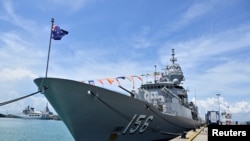China has urged Australia to notify it of navy movements in the contested South China Sea and East China Sea, with a senior Chinese official cautioning that a small incident between militaries could escalate and damage ties.
Australia's Prime Minister Anthony Albanese last week said a Chinese warship acted in a dangerous manner by using its sonar during an incident with an Australian navy vessel in Japan's waters that injured a military diver.
The same Australian vessel, Toowoomba, began joint patrols with the Philippines in the South China Sea for the first time on Saturday, amid rising tensions between Beijing and Manila over a disputed shoal.
Speaking in Sydney on Tuesday, the head of the international department of the Chinese Communist Party, Liu Jianchao, said the sonar incident took place in waters where there is a dispute between Japan and China, and questioned why the Australian navy was there.
Liu, who denied China had harmed Australian navy personnel, called for "any kind of pre-consultations or notification" to prevent misunderstandings from happening between two militaries.
"Such small incidents could really escalate if it's not properly managed," he said, referring to public emotions. He was speaking in response to questions at an event hosted by the Australia-China Relations Institute at the University of Technology, Sydney.
Liu said the presence of Australia's navy vessels appeared to be a statement about China's policies in the South China Sea.
"The reason why the Australian naval ships were there was really to contain China - so that is the message that we have been getting," he said.
He urged the Australian government and military to "act with great prudence in this area."
Australia has previously said it respects the right of all states to exercise freedom of navigation and overflight in accordance with international law. Two-thirds of Australian trade passes through the South China Sea.
This month Albanese made the first visit by an Australian leader to China in seven years, after efforts by both sides to stabilize the relationship.






